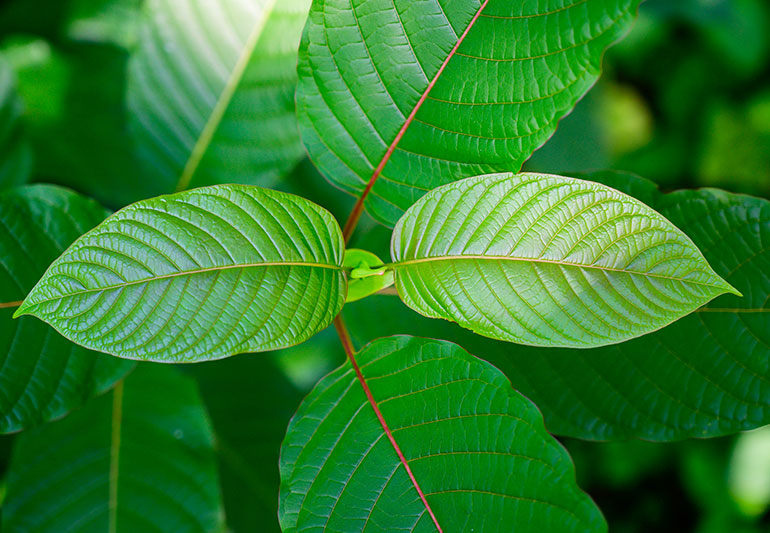

Kratom is one of those plants that you might assume is a safer, natural alternative to other drugs. But don’t be fooled: There’s a dark side to kratom-derived pills, powders and teas.
In this Q&A, integrative medicine specialist Yufang Lin, MD, explains why “natural” doesn’t always mean safe, especially when it comes to kratom.
Q. What is kratom?
A. Kratom (Mitragyna speciosa) is a tree in the coffee family. It’s found in Southeast Asia and Africa. Traditionally, people have:
- Chewed kratom leaves.
- Made kratom tea to fight tiredness and improve productivity.
- Used kratom as medicine.
- Substituted kratom for opium.
- Used kratom during religious ceremonies.
Q: What does it do?
A: Low doses of kratom can make you more alert. However, high doses of kratom can cause:
- Decreased pain.
- Pleasure.
- Sedation.
This is because two of the compounds in kratom (mitragynine and 7-hydroxymitragynine) interact with opioid receptors in your brain.
Q: Why do people use kratom?
A: Precisely because kratom interacts with the brain’s opioid receptors, some people use it to relieve pain or overcome opioid addiction. Medical communities now try to shy away from opioid use for pain, so many patients who previously relied on them no longer can. Scrambling to find alternatives, some people turn to kratom, which is a compelling replacement because it has similar pain-relieving effects.
People tend (however incorrectly) to think that kratom is safe because it’s “natural.” It’s also legal and easily obtainable in many states — without the stigma attached to narcotics.
Q: How is kratom used?
A: Traditionally, people drink kratom as a tea or chew its leaves. Kratom can also be found in resins, extracts and tinctures. On the street, you may find kratom in pills, capsules, powders or even drinks. In Thailand, for example, you can buy a concoction made with kratom leaves, cough syrup, cola and ice.
Q: Does kratom have any side effects?
A: Yes. Don’t let the fact that kratom is “natural” trick you into thinking it’s safe. In fact, kratom’s potential for severe side effects outweigh its potential benefits — and in extreme cases, kratom has even caused death.
The most common side effects of kratom are:
- Aggression.
- Altered mental status.
- Anxiety and irritability.
- Constipation.
- Delusion and hallucination.
- Drowsiness and sedation.
- Dry mouth.
- Frequent urination.
- Itching.
- Nausea and vomiting.
- Tongue numbness.
Other serious kratom side effects include:
- Cardiac issues, such as heart attack, abnormal heart rhythms and high blood pressure.
- Encephalopathy (brain disease).
- Hallucination.
- Hypothyroidism (underactive thyroid).
- Insomnia.
- Liver damage and liver failure.
- Rhabdomyolysis (A condition that leads to kidney damage when muscles disintegrate and release a protein into the blood).
- Respiratory depression (difficulty breathing).
- Seizure.
Long-term kratom users may also experience:
- Increased cheek pigmentation.
- Loss of appetite.
- Tremor.
- Psychosis.
- Weight loss.
Q. Is kratom addictive?
A: As with opioids, you can get addicted to kratom. People going through kratom withdrawal may experience:
- Muscle spasms.
- Pain.
- Rhabdomyolysis.
- Rigidity.
- Seizures.
- Tremors.
Q: Is kratom legal?
A: The U.S. Food and Drug and Administration (FDA) has warned consumers about the dangers of using kratom. And as of mid-2021, kratom is illegal in six states:
- Alabama.
- Arkansas.
- Indiana.
- Rhode Island.
- Vermont.
- Wisconsin.
In some states, including California, Colorado, Florida and Mississippi, kratom is legal under state law but banned or controlled in some individual cities, towns and counties. In other states, various kratom legislation is still pending.
Globally, kratom is illegal or restricted in more than a dozen countries, including parts of Europe, Japan and Russia.
Q. Is kratom safe to use?
A: Due to its dangerous health effects — plus the very real risk of getting your hands on low-quality and contaminated kratom products — you should not use kratom in any form.
If you are experiencing pain or want to overcome opioid addiction, talk to your doctor. Together, you can find a safe way to reach your health goals.
more recommended stories
 Red Blood Cells Improve Glucose Tolerance Under Hypoxia
Red Blood Cells Improve Glucose Tolerance Under HypoxiaKey Takeaways for Clinicians Chronic hypoxia.
 Pediatric Crohn’s Disease Microbial Signature Identified
Pediatric Crohn’s Disease Microbial Signature IdentifiedKey Points at a Glance NYU.
 High-Fat Diets Cause Damage to Metabolic Health
High-Fat Diets Cause Damage to Metabolic HealthKey Points Takeaways High-fat and ketogenic.
 Can Too Many Antioxidants Harm Future Offspring?
Can Too Many Antioxidants Harm Future Offspring?Key Takeaways High-dose antioxidant supplementation in.
 Human Antibody Drug Response Prediction Gets an Upgrade
Human Antibody Drug Response Prediction Gets an UpgradeKey Takeaways A new humanized antibody.
 Dietary Melatonin Linked to Depression Risk: New Study
Dietary Melatonin Linked to Depression Risk: New StudyKey Summary Cross-sectional analysis of 8,320.
 Type 2 Diabetes Risk Identified by Blood Metabolites
Type 2 Diabetes Risk Identified by Blood MetabolitesKey Takeaways (Quick Summary) Researchers identified.
 Microglia Neuroinflammation in Binge Drinking
Microglia Neuroinflammation in Binge DrinkingKey Takeaways (Quick Summary for HCPs).
 Durvalumab in Small Cell Lung Cancer: Survival vs Cost
Durvalumab in Small Cell Lung Cancer: Survival vs CostKey Points at a Glance Durvalumab.
 Rising Chagas Parasite Detected in Borderland Kissing Bugs
Rising Chagas Parasite Detected in Borderland Kissing BugsKey Takeaways (At a Glance) Infection.

Leave a Comment